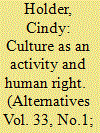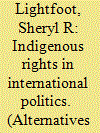|
|
|
Sort Order |
|
|
|
Items / Page
|
|
|
|
|
|
|
| Srl | Item |
| 1 |
ID:
082035


|
|
|
|
|
| Publication |
2008.
|
| Summary/Abstract |
Historically, culture has been treated as an object in international
documents. One consequence of this is that cultural
rights in international law have been understood as rights of
access and consumption. Recently, an alternative conception
of culture, and of what cultural rights protect, has emerged
from international documents treating indigenous peoples.
Within these documents culture is treated as an activity rather
than a good. This activity is ascribed to peoples as well as persons,
and protecting the capacity of both peoples and persons
to engage in culture is taken to be as basic a component of human
dignity as are freedom of movement, freedom of speech,
and freedom from torture.
It is not an accident that this treatment of culture has
emerged from international documents treating indigenous
peoples, for indigenous peoples' cultural rights can be fully
understood only against the background of their basic rights
to self-determination. However, the value of this treatment of
culture extends beyond the human rights of indigenous peoples.
Treating culture as an activity establishes an understanding
of what cultural rights protect that clarifies the relationship
between cultural rights and other mechanisms for protecting
minorities and frames the role of cultural communities in the
realization of human dignity as an important physical and political
issue, not just a psychological one. This article offers an
account of what is wrong with violating cultural rights that
clearly and straightforwardly links violations of a group's cultural
rights to violations of its rights to persist and to flourish. For
these reasons, the norms regarding cultural rights that are
emerging from international documents treating indigenous
peoples are a much-needed step forward for peoples' rights
more generally
|
|
|
|
|
|
|
|
|
|
|
|
|
|
|
|
| 2 |
ID:
082038


|
|
|
|
|
| Publication |
2008.
|
| Summary/Abstract |
While indigenous peoples have made great strides to institutionalize
principles supporting indigenous rights in the global
arena, many of these advances will require recognition and
implementation by nation-states in domestic contexts to have
their greatest effect. How do these emerging global norms
shape the potential for indigenous peoples to influence domestic
governance? To provide insight into this question, we
use historical research and interview data to examine Japan's
policy toward the Ainu. Globally, indigenous peoples are defined
by a collective subjective process; that is, in international
meetings in which indigenous peoples participate, indigenous
peoples act together to recognize other peoples as indigenous.
Such recognition by the global indigenous peoples' movement
provided legitimacy and enhanced agency for the Ainu in the
face of the Japanese government's continued nonrecognition
of the Ainu as an indigenous people. Despite this international
legitimacy, the institutional structures of the Japanese state
mediate the effects of international influences and limit Ainu
domestic self-determination and participation in governance.
Domestic policies based on cultural promotion and Ainu welfare
provide few points of direct contact between Ainu leaders
and the Japanese bureaucracy; further, these points of contact
tend to be isolated from the parts of the bureaucracy most subject
to international influence. Although the pace of change
has been slow and its extent limited, Japan's continued lack of
recognition of the Ainu as an indigenous people creates policy
tension that enables Ainu and others influenced by global
norms to use these limited channels of domestic influence and
global pressures to renew calls for further changes
|
|
|
|
|
|
|
|
|
|
|
|
|
|
|
|
| 3 |
ID:
082036


|
|
|
|
|
| Publication |
2008.
|
| Summary/Abstract |
Multiculturalism has been offered as an answer to the civil
rights claims of a wide variety of ethnic and national minorities
within liberal democratic settler-states. This article adds to
the critiques of the appropriateness of multiculturalism in
answering the self-determination claims of indigenous populations
by investigating biculturalism in Aotearoa/New Zealand.
Indigenous groups continue to demand greater recognition
not only of sui generis claims to land and resources but
also to the acceptance of indigenous philosophies and perspectives
in the management of land and resources. As indigenous
populations have been forced toward the edge of the
state, they have been forced to reassert their cultural values in
order to fundamentally reinvent the relationship between colonizer
and colonized. This "reinvention" of society, coming
from the edges, propelled by indigeneity, is beginning to challenge
the construction of the white settler-state. These challenges
occur in places, not within arbitrary, theoretical space.
They also vary in scale, from the single individual acting on
behalf of her community to vast land claims by indigenous
peoples. This article discusses how the exercise of indigenous
self-determination, observed in specific places, is beginning to
transform Aotearoa/New Zealand society into a bicultural and
binational partnership, altering the meaning of citizenship for
both Ma¯ori and whites.
|
|
|
|
|
|
|
|
|
|
|
|
|
|
|
|
| 4 |
ID:
082037


|
|
|
|
|
| Publication |
2008.
|
| Summary/Abstract |
An overcompliant state is one that paradoxically takes actions
that recognize specific rights or a category of rights that go
beyond or even against that state's international human rights
treaty obligations or its normative international commitments.
Since there is no existing IR literature that would explain why
a state might paradoxically comply or "overcomply" with its
stated commitments, there is also no theory to explain what
would propel a state to "overcomply" with an emergent norm.
Securing indigenous rights means that several critical changes
in the international discourse must occur, including an alteration
of the liberal international Westphalian system of state
sovereignty toward a postliberal, plurinational sovereignty system
that includes a separate nation-to-nation and consentbased
shared sovereignty arrangement between states and
indigenous peoples. "Overcompliance" in indigenous rights
occurs under a particular set of conditions: (1) when there is
a strong presence of the international indigenous-rights movement
within the state; (2) when the state places high value on
its reputation as a "good global citizen"; and (3) when change
occurs in the state's domestic discourse as it seeks to locate its
own postcolonial identity in a globalized world. By examining
state "overcompliance," the author seeks to expose the limits of
the current international discourse and the potential to push
that discourse further to better accommodate the full spectrum
of indigenous rights.
|
|
|
|
|
|
|
|
|
|
|
|
|
|
|
|
| 5 |
ID:
082034


|
|
|
|
|
| Publication |
2008.
|
| Summary/Abstract |
The articles in this second of a series of three issues edited by
faculty in the Political Science Department at the University of
Hawai'i at Manoa examine the concept of "indigeneity" as it
pertains to aspects of law, policy, and governance. Focused on
the array of temporal and historical issues surrounding nationhood,
citizenship, law, and policy, the authors interrogate how
historical legal systems evolve through control of and resistance
by indigenous peoples and what the actions by state actors
say about how legal institutions treat the concept of "indigeneity."
The key issues surrounding "indigeneity" as a site of
critical inquiry within legal systems and governmental structures
raise key questions that these articles explore: What new
policies and systems are being created in the wake of global imperialism,
the war on terror, and the policing of national borders?
How are indigenous peoples rearticulating understandings of
governance and policy in their struggles for recognition, independence,
self-determination, and sovereignty? Finally, what distinguishes
indigenous governance, law, and policy, and what are
the possibilities and challenges facing such institutions both
locally and transnationally?
|
|
|
|
|
|
|
|
|
|
|
|
|
|
|
|
| 6 |
ID:
082039


|
|
|
|
|
| Publication |
2008.
|
| Summary/Abstract |
More than eighty years since Chief Deskaheh petitioned the
League of Nations for Haudenosaunee self-determination, it is
becoming clearer that the existing rights discourse can take indigenous
peoples only so far. States and global/regional forums
have framed self-determination rights that deemphasize the responsibilities
and relationships that indigenous peoples have
with their families and the natural world (homelands, plant life,
animal life, etc.) that are critical for the health and well-being of
future generations. What is needed is a more holistic and dynamic
approach to regenerating indigenous nations, and I propose
the concept of sustainable self-determination as a benchmark
for future indigenous political mobilization. Utilizing case studies
of indigenous community regeneration such as the Native
Federation of Madre de Dios (FENAMAD) in Peru and the
White Earth Land Recovery Project (WELRP) on Turtle Island
as well as analyzing the existing research on rights, political
mobilization, and ecosystems, this article identifies alternatives
to the existing rights discourse that can facilitate a meaningful
and sustainable self-determination process for indigenous peoples
around the world. Overall, findings from this research
offer theoretical and applied understandings for regenerating
indigenous nationhood and restoring sustainable relationships
on indigenous homelands
|
|
|
|
|
|
|
|
|
|
|
|
|
|
|
|
|
|
|
|
|